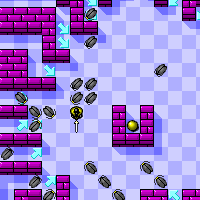| Our hero, Beethro Budkin |
What makes DROD so great? It is an exploration and puzzle game with simple rules but infinite variety.
The premise is simple. You are Beethro Budkin, a dungeon exterminator who has been hired by the king to clear his dungeons of all the monsters infesting them so that his prisoners can be tortured in conditions that pass health and safety checks.
With your specialist equipment (A really big sword), you delve into the dungeon.
Each dungeon is made up of rooms, each room being a different puzzle. The aim of each room is to kill all of the monsters and leave the room. Once you have completed the level, you can move on to the next one.
 |
| A room full of cockroaches. The yellow circle is a switch which will open or close one or more doors. The arrows are one way squares. |
Cockroaches, for example, have no intelligence and head straight for you. They will just walk into your sword. However, goblins flee if they can see that you are close to being able to impale them and so they are more tricky monsters to kill.
 |
| The aim of each room is to kill all of the monsters and open the green door (bottom left). |
Actually, there aren't too many different special objects, but they present infinite combinations and so you could make thousands of possible puzzles from these simple rules. The Architects' edition allows you to build your own dungeons and rooms which allows you to spend several hours letting your imagination run wild.
The game has nice touches of humour, such as the introduction and the way Beethro grins when he kills something and laughs when he solves a room. It adds nice character to the game.
As well as being addicitve and engrossing, DROD is a great maths game. It certainly stretches your brain. And the best part is that this is just a really old version of DROD. There are several other versions which you can buy and which have even more deadly rooms for you to solve.
DROD has shown me that gamebooks do not need a load a complex stats to be fun. In fact, these stats can be distracting from the game. My micro adventure, City of the Dead had too many stats for a 81 paragraph gamebook. I was too intent of creating a system that covered every situation rather than an entertaining gamebook.
Fighting Fantasy books have three stats that don't even cover attributes such as the hero's intelligence, but it hasn't stopped them being hugely successful. In fact their simplicity probably helped. You don't need stats for everything if they are not a huge part of the story. Instead, it is much better to be creative with what stats you have. A good example of how this is done really well is Destiny Quest. You only have a few stats, but you can also get lots of abilities which let you make rerolls or give you bonuses or weaken opponents which give you the great challenge of aking the correct decisions to use your abilities wisely.



